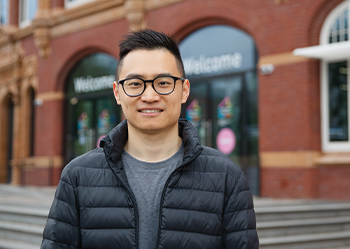University News Last updated 21 May 2024

Researchers at Birmingham City University (BCU) are using virtual reality (VR) to help manufacturers design driverless cars that don’t put deaf and hard of hearing pedestrians in harm’s way.
Automated vehicles are growing increasingly popular in the UK but not all designs are people friendly, especially those people with disabilities or specialist needs, which can make it challenging keeping everyone safe on British roads.
But Dr Wenge Xu, principal investigator and an expert in human-computer interaction at BCU, says technology can play a key role in overcoming those challenges.
“Drivers often communicate with pedestrians and cyclists using hand signals, head gestures, and eye contact,” said Dr Xu.
“But when humans are no longer in the driving seat, these traditional methods will be replaced by an External Human-Machine Interface (eHMI).”
And that is where the problem lies, as Dr Xu’s colleague, Dr Foroogh Hajiseyedjavadi explained.
“Currently, there are no fully operational highly automated vehicles with eHMI capabilities on the roads,” said Dr Hajiseyedjavadi, a lecturer in Civil Engineering at BCU.
“However, ongoing development efforts have produced prototypes of eHMI designs. In this context, it becomes paramount to integrate considerations for disabled people.”
There are 11 million deaf and hard of hearing people in the UK – and 400 million worldwide – yet their needs have not been considered in current eHMI research and development.
“By incorporating their needs into the design phase, we can ensure inclusivity and accessibility for all users, fostering a more equitable transportation landscape,” Dr Xu said.
BCU’s team will be the first to use VR and a user-centred design approach to simulate how deaf and hard of hearing people interact with cars so that automated vehicles can be developed with their needs in mind.
“Current designs rely on audio cues that deaf people won’t be able to hear and digital signs that they may not be able to understand if their first language is British Sign Language,” Dr Xu said.
“BCU is at the forefront of accessibility research and immersive technology. We’ll bring deaf and hard of hearing people into the design process. Using VR headsets, we’ll immerse them in a realistic road setting and track their eye and body movement to understand their reactions.”
Funded by a £70,000 grant from the Royal Society, the project will involve Dr Xu working with a number of major car manufacturers and charities.
Dr Xu said the ultimate goal is to develop an inclusive interface that is suitable for everyone.
“When we have a design that meets the needs of deaf and hard of hearing people, we’ll explore how this can be extended to people with other disabilities,” he said.
Professor Hanifa Shah, Pro-Vice-Chancellor and Executive Dean of BCU's Faculty of Computing, Engineering and the Built Environment, has given her backing to the project.
“Here at BCU, we believe it’s important to apply our expertise in advanced technologies to solve problems and make a difference to people’s lives,” she said.
“This project is a wonderful example of our ‘knowledge in action’ approach. We look forward to seeing how we can create safer streets for deaf people through this vital research project.”